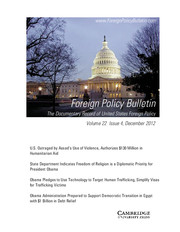Editorial Comments
EDITOR’S NOTE
The George W. Bush era is over – and now comes: how much change? In this issue we start compiling the foreign policy documents of the new Barack Obama administration.
So far, while the new administration has been energetic in making foreign policy appointments, including special envoys for Israel/Palestine, Afghanistan/Pakistan, Sudan, and for Climate Change, there have been no new major foreign policy initiatives. The main shifts visible at this point in early May are a toning-down of rhetorical and financial support for human rights and democracy initiatives in authoritarian countries, and a few important but primarily symbolic changes, such as closing down the prison at Guantanamo Bay, Cuba; making overtures for talks to Iran; reducing some restrictions on travel of Americans to Cuba to visit relatives; and disavowing torture. More striking is the degree of continuity with Bush-era policies, such as continuing predator drone attacks in the Pakistan frontier region, supporting Middle East allies Saudi Arabia and Egypt, and maintaining a strong military presence in Iraq.
Of course, it is early in the Obama administration; we are barely 100 days into a four-year, or possibly eight-year, effort to adapt to a rapidly changing world. The challenges are immense: Iran and North Korea continue to rattle the sabers of their nuclear technologies; the Taliban insurgency in Afghanistan has deepened and spread to Pakistan; Russia has been aggressive in Georgia and in its control of natural gas supplies to Europe; and weak states from Haiti to Sudan to Thailand continue to struggle with uncertain transitions to democracy and social order. Pirates from Somalia, violence in the oil-rich Niger delta and Gulf of Guinea, and an increasingly dangerous drug-induced struggle along the Mexican border threaten normal flows of commerce. Finally, the U.S. needs to work with all major economies to forge a new global financial structure that will guard against future world-wide bank collapses, while at the same time helping developing nations cope with the fallout of the current financial crisis.
Fortunately, there are positive signs as well. China and Taiwan continue to improve their relations; an uneasy truce is holding in Lebanon; Sri Lanka seems on the verge of ending the long and bloody Tamil Tigers rebellion; and South Africa and Ghana have peacefully chosen new leaders.
The Foreign Policy Bulletin will record the Obama administrations new policy statements, and other important U.S. and world documents, for your convenience and ready access. But as we look forward, you can also look back — the entire contents of Foreign Policy Bulletin over the last 29 years are now available and searchable on line for subscribers, through the Foreign Policy Bulletin website with Cambridge University Press. Visit us at http://journals.cambridge.org/action/displayJournal?jid=FPB.
Jack A. Goldstone, Editor
jgoldstone@gmu.edu
Kevin J. Fandl, Managing Editor
kfandl@gmu.edu
PHOTO CREDITS
Page 67, White House Photo
Page 118, White House Photo
Page 200, State Department Photo
Page 226, State Department Photo
Page 253, State Department Photo
MISSION STATEMENT
The Foreign Policy Bulletin is a reference periodical published quarterly by Cambridge
In addition to major addresses, statements, and other public reports and remarks of the President, Secretary of State, and Administration officials in other foreign affairs agencies, the Foreign Policy Bulletin includes excerpts from pivotal debates in the Congress; speeches and other statements by foreign and international officials; relevant texts and reports from international organizations; summaries and listings of treaties and other agreements to which the United States is a party; and other information of particular interest to the study of U.S. foreign relations.
The Foreign Policy Bulletin is not affiliated with any government or international institution, and has complete editorial autonomy.
Each issue has a name and subject index as well as a list of documents. There is an annual index at the end of each volume.
INDEXING: Included in the PAIS (Public Affairs Information Service) indexes: the PAIS Bulletin, PAIS on CD-Rom, and online through Dialog, BRS, and Data Star.




